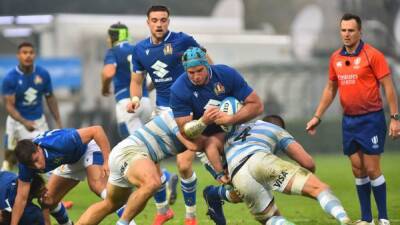Rugby union at crossroads as need for entertainment threatens safety
Everyone who enjoys rugby union will have winced at some stage over the weekend. For many it will have been the moment when Italy’s admirable captain, Michele Lamaro, discovered his team would, by the dispiriting letter of the law, have to soldier on with 13 men for an hour against one of the world’s top sides. Alternatively, it might have been the footage of a staggering Tomas Francis rejoining the fray at Twickenham having exhibited precisely the kind of ataxia symptoms that should see players permanently removed.
Or maybe it was the frequent long stoppages in both games. Or the time-consuming reset scrums. Or the constant peep of the referee Mike Adamson’s whistle during England v Wales. Or the distracting ebb and flow of water carriers entering the field of play? Or the lack of consistency when the Irish forward Ryan Baird caught his Italian opponent Marco Zanon with the same kind of upright tackle which had led to the Azzurri’s replacement hooker, Hame Faiva, being handed a red card.
As it happened the grimmest development of all, Ukraine excepted, was still to come. And shocking it was, too. The preliminary findings of a study by the Australian Sports Brain Bank into the long-term ramifications of concussion in sport have been published, with chronic traumatic encephalopathy discovered in the brains of more than half of the deceased sportspeople examined, including three under the age of 35. Of 21 brains posthumously donated since 2018 by people involved in sports with a risk of repetitive head injury, 12 were found to have CTE lesions while all but one showed some form of neurodegeneration.
Which just leaves us with the stark testimony of the former Ireland flanker David Corkery in a powerful, sensitively written






